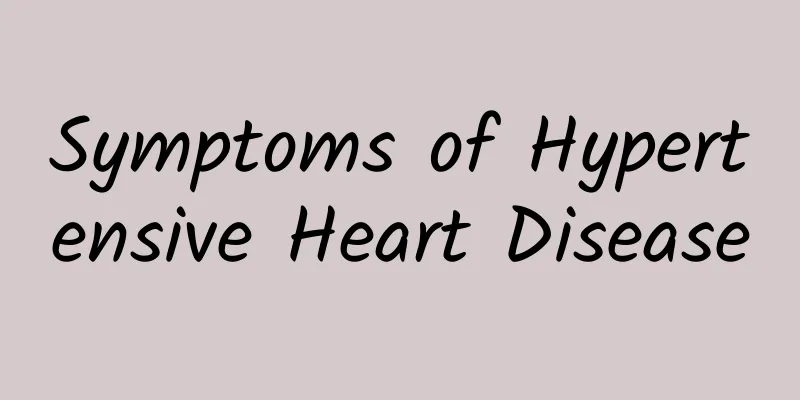Symptoms of Hypertensive Heart Disease

|
Hypertension and heart disease are very harmful to the human body. Although these diseases may occur, they must be treated in time after suffering from such diseases. In addition, in life, if you suffer from these two diseases, you must make reasonable arrangements in diet, emotions, and exercise. This will be very helpful in preventing the development of the disease. What are the symptoms of hypertensive heart disease? Many people are not very clear about the symptoms of hypertensive heart disease. When suffering from this disease, the patient's body will also have obvious symptoms. So what are the symptoms? The following is a detailed introduction. Symptoms of Hypertensive Heart Disease: 1. Early clinical manifestations Early manifestations are generally atypical. Patients may have no obvious symptoms or only mild discomfort such as headache, chest tightness, etc. These symptoms are mainly general symptoms of hypertension and are not specific. 2. Progressive clinical manifestations In hypertension, the arterial pressure is too high, which hinders the heart from pumping blood. Long-term high-load work of the heart causes myocardial hypertrophy and increased stiffness, which eventually leads to obstruction of the pulmonary venous blood entering the heart and the formation of pulmonary congestion. When the myocardium is enlarged, the oxygen demand increases and the blood supply is relatively insufficient, which often leads to heart failure. The clinical manifestations of diastolic heart failure and systolic heart failure are similar and difficult to differentiate clinically. The clinical features of heart failure caused by hypertension are as follows: (1) Due to abnormal left ventricular diastolic/systolic function, pulmonary congestion may occur, mainly manifested as ① Dyspnea caused by exertion; ② Shortness of breath when lying flat, which improves after sitting up; ③ Dyspnea occurs even when the amount of activity is not large, and in severe cases the patient may wake up from sleep; ④ In severe cases, the patient may orthopnea, cough, and cough up pink foamy sputum. (2) Left heart failure can often lead to a decline in right ventricular function, resulting in total heart failure, which is mainly manifested by ① The jugular vein is obviously full; ② Right upper abdominal pain and liver enlargement; ③ Edema of both lower limbs, and in severe cases, systemic edema may occur; ④ Oliguria. The above is a detailed introduction to the symptoms of hypertensive heart disease. When the above situation occurs, patients need to go to the hospital for examination in time to receive treatment. For heart disease patients, they should pay attention to their diet during the treatment of the disease and eat less greasy food, otherwise it will not help the treatment of the disease. |
<<: Diet therapy for wind-heat cold
Recommend
The efficacy of Viola yedoensis
Viola yedoensis is a plant herb with high medicin...
Lumbar disc effusion
Lumbar disc effusion can be caused by fluid accum...
What are the adverse reactions of ceftriaxone?
In real life, infusion is a way to treat physical...
Can Korean steaming help you lose weight?
Korean steaming is a popular way of steaming nowa...
What happens when pregnant women have white particles on their nipples?
It is best for mothers to breastfeed their babies...
Drooling when sleeping smells bad. Do you know these hidden dangers?
In real life, most people have experienced drooli...
Nepenthes
Nepenthes is a common plant medicine in tradition...
What to do if the calf itches and bleeds
The calves are itchy and there will be bleeding s...
Can Chrysanthemum Brain Lower Blood Sugar?
From ancient times to the present, there have bee...
Does eating dates hurt your stomach?
There are many foods in life that have two sides....
Which is better, Korean steam steam or nano steam steam?
As there are more and more ways of sweat steaming...
Does drinking Chinese medicine have any effect on the fetus?
Pregnant women cannot take medicine during pregna...
What diseases are prone to occur at night
As people get older, all kinds of problems arise,...
How to treat cerebral ischemia
Cerebral ischemia is a relatively common disease....
How to cook Artemisia selengensis water
How to boil Artemisia annua water? Artemisia annu...









